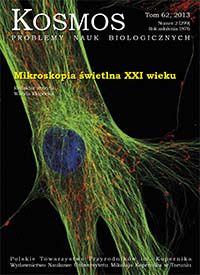The confocal microscopy in cancer diagnosis
Abstract
Life conditions improvement and the development of common medical care had a significant influence on a life expectancy leading simultaneously to a higher probability of oncogenic mutations accumulation in cells and aberrations drawing to cancer. Furthermore, it was observed that the frequency of cancer diseases is considerably related to the harmful carcinogens present in the environment and everyday diet. Thus, diseases with oncological background has become a global problem concerning every developed society. The popularity of incidence, diversity and the scale of the disease compel scientific environment to invent an advanced diagnostic methods that would enable an accurate, quick and possibly cheapest tissue aberration verification. The therapy starting point and the opportunity to dodge the critical metastatic stage of cancer is mainly depending on the accurateness of the preliminary diagnostics. Contemporary tumor diagnostic methods consist of 3 main types: laboratory diagnostics (based on biochemical testing of specific enzyme and cancer markers activity), pathomorphology (histopathological analysis of tissue biopsies and cytological rating) and visual diagnostics (RTG, USG, magnetic resonance or computer tomography). The development of confocal microscopy, the technique which allows the analysis of single-molecule interactions, together with state of the art CCD cameras and powerful computers represent a tool of great diagnostic potential. Due to high-resolution images, non-invasive patient approach as well as rapidity in obtaining results, confocal microscopy may soon become an invaluable tool in cancer diagnostics. It is a main rival of traditional histopathological screening that requires a deviant tissue removal, precise and time-consuming preparation and analysis. In this article we present various ways of confocal microscopy employment already present in cancer diagnostics as well as survey animal-stage studies utilizing this technique.Downloads
Download data is not yet available.
Downloads
Published
2017-12-09
Issue
Section
Articles



